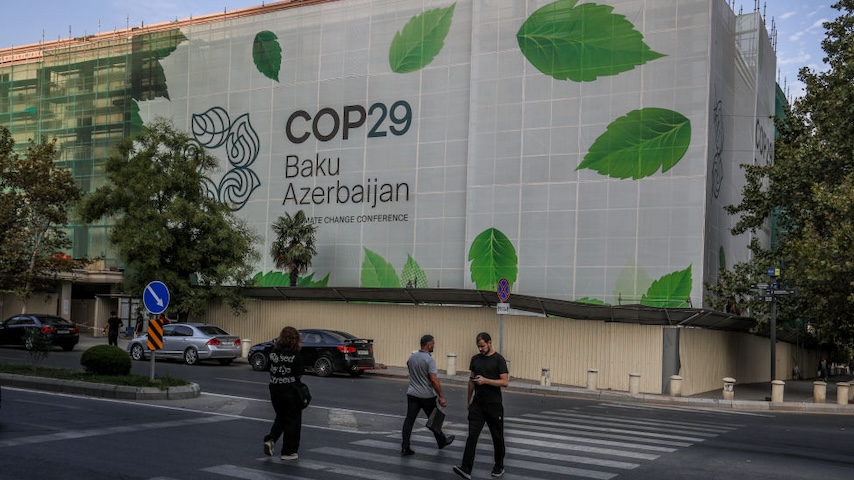Rich Countries Could Drum Up $5 Trillion for Climate Finance By Taking Aim At Fossil Fuels, Rich People: Report
Photo by Aziz Karimov/Getty Images
Heading toward COP29 in Baku, Azerbaijan, climate finance is front and center. The steep and increasing cost of both managing the current and future impacts of a warmer world and building out clean infrastructure is supposed to fall on rich countries, the ones that were primarily responsible for the problem to begin with. But those developed nations took their sweet time even getting to a 2009 promise of $100 billion per year in climate finance; where might they find the resources to send it north of the $1 trillion line that is clearly needed?
“There is no shortage of public money available for rich countries to pay their fair share for climate action at home and abroad,” said Laurie van der Burg, the public finance lead for non-profit Oil Change International, in a press release introducing a new report, which is supported by 36 separate organizations. “They can unlock trillions in grants and grant-equivalent climate finance by ending fossil fuel handouts, making polluters pay and changing unfair financial rules.”
The report claims that rich countries — technically known as annex II nations, as defined by the U.N.’s climate change body, a group that notably does not include world’s biggest emitter and second biggest economy, China — can scrounge up north of $5 trillion every year in publicly available money to support their climate finance obligations. That is a lot of money.
The specific sources of the funding are, let’s say, aspirational. The rich world could generate $270 billion by ceasing their funding of fossil fuels in the form of subsidies or state-owned companies; $160 billion could come from extracting a damages tax from major polluters; another $180 billion is available with aviation and maritime shipping taxes. Then there are items a little less tightly connected to climate change: $395 billion by raising minimum corporate tax rates to 25 percent, $363 billion by cracking down on tax evasion, $240 billion from a financial transaction tax. Dare to dream: $260 billion by redistributing 20 percent of public military spending, or a ripe $2.56 trillion just from increasing wealth taxes on millionaires and billionaires.
It is quite the list. Obviously, rich countries have generally shown no inclination to do any of these sorts of things, with very few exceptions; but that’s sort of the point when it comes to climate finance: this was unprecedented and irreversible damage, time for the culprits to turn over any and every couch cushion available.
“It is a bitter irony that rich nations hide behind claims of fiscal restraint, yet trillions are still spent on fossil fuel subsidies and militarization,” said Andreas Sieber, the associate director of policy and campaigns for the non-profit 350.org. “The truth is simple: the money exists, but the political will does not.”